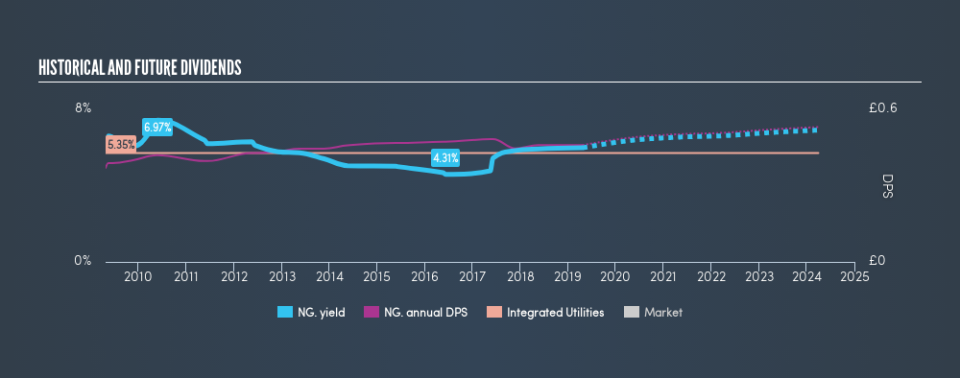Should Investors Buy National Grid plc (LON:NG.) And Lock In The 5.6% Dividend Yield?

Over the past 10 years National Grid plc (LON:NG.) has grown its dividend payouts from £0.37 to £0.46. With a market cap of UK£28b, National Grid pays out 46% of its earnings, leading to a 5.6% yield. Let me elaborate on you why the stock stands out for income investors like myself.
See our latest analysis for National Grid
What Is A Dividend Rock Star?
It is a stock that pays a reliable and steady dividend over the past decade, at a rate that is competitive relative to the other dividend-paying companies on the market. More specifically:
Its annual yield is among the top 25% of dividend payers
It has paid dividend every year without dramatically reducing payout in the past
Its dividend per share amount has increased over the past
It can afford to pay the current rate of dividends from its earnings
It is able to continue to payout at the current rate in the future
High Yield And Dependable
The company's dividend yield stands at 5.6%, which is high for Integrated Utilities stocks. But the real reason National Grid stands out is because it has a proven track record of continuously paying out this level of dividends, from earnings, to shareholders and can be expected to continue paying in the future. This is a highly desirable trait for a stock holding if you're investor who wants a robust cash inflow from your portfolio over a long period of time.
If there is one thing that you want to be reliable in your life, it's dividend stocks and their constant income stream. NG. has increased its DPS from £0.37 to £0.46 in the past 10 years. It has also been paying out dividend consistently during this time, as you'd expect for a company increasing its dividend levels. This is an impressive feat, which makes NG. a true dividend rockstar.
The company currently pays out 46% of its earnings as a dividend, according to its trailing twelve-month data, which means that the dividend is covered by earnings. Going forward, analysts expect NG.'s payout to increase to 84% of its earnings. Assuming a constant share price, this equates to a dividend yield of around 6.1%. However, EPS is forecasted to fall to £0.56 in the upcoming year. Therefore, although payout is expected to increase, the fall in earnings may not equate to higher dividend income.
When assessing the forecast sustainability of a dividend it is also worth considering the cash flow of the business. A company with strong cash flow, relative to earnings, can sometimes sustain a high pay out ratio.
Next Steps:
Investors of National Grid can continue to expect strong dividends from the stock. With its favorable dividend characteristics, if high income generation is still the goal for your portfolio, then National Grid is one worth keeping around. However, given this is purely a dividend analysis, you should always research extensively before deciding whether or not a stock is an appropriate investment for you. I always recommend analysing the company's fundamentals and underlying business before making an investment decision. Below, I've compiled three key factors you should further research:
Future Outlook: What are well-informed industry analysts predicting for NG.’s future growth? Take a look at our free research report of analyst consensus for NG.’s outlook.
Historical Performance: What has NG.'s returns been like over the past? Go into more detail in the past track record analysis and take a look at the free visual representations of our analysis for more clarity.
Other Dividend Rockstars: Are there strong dividend payers with better fundamentals out there? Check out our free list of these great stocks here.
We aim to bring you long-term focused research analysis driven by fundamental data. Note that our analysis may not factor in the latest price-sensitive company announcements or qualitative material.
If you spot an error that warrants correction, please contact the editor at editorial-team@simplywallst.com. This article by Simply Wall St is general in nature. It does not constitute a recommendation to buy or sell any stock, and does not take account of your objectives, or your financial situation. Simply Wall St has no position in the stocks mentioned. Thank you for reading.

